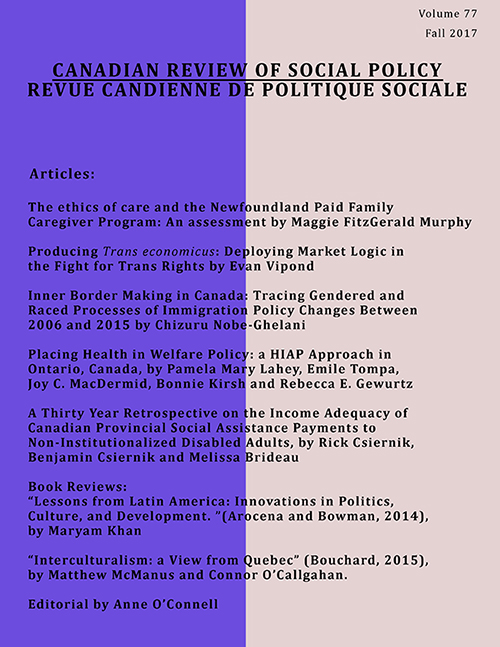The Income Adequacy of Provincial Social Assistance Payments to Non-Institutionalized Disabled Adults: Continuing Evidence Why Canada Needs a Guaranteed Annual Income Policy
Keywords:
disabled, social assistance, income maintenance, Canada, poverty, guaranteed annual incomeAbstract
An analysis of social assistance programs for non-institutionalized disabled adults found inconsistent income levels being provided between provinces. In less than half of the four family constructions created, a single disabled person, a married couple both disabled, a single parent with two children and a married couple, one disabled, one care taking and two children, did income exceed the Statistics Canada Low-Income Cut-Off. The majority of these instances arose because of the additional federal child support payments provided to families with children, a new initiative aimed at attempting to eliminate childhood poverty in Canada. The analysis also found that the larger the community the greater the likelihood of the disabled individual living in poverty. While improvements have occurred in some jurisdictions overall being disabled and unable to work equates to living in poverty in Canada. This analysis of income supports for this vulnerable populations contributes to the growing support for the development of a guaranteed annual income in Canada.
Published
How to Cite
Issue
Section
License
1-The author guarantees that the manuscript is an original work not published elsewhere in print or electronically in whole or in part, except in abstract form, that the author has the full power to make this contribution, and that the manuscript contains no matter libelous or otherwise unlawful or which invades the right of privacy or which infringes any proprietary right.
2-The author guarantees that the manuscript has not been previously published in print or electronically and that if the manuscript contains any tables, figures or images fully reproduced or closely adapted from previously published material, the author must obtain the necessary permission from the author/publisher holding the original copyright prior to publication in CRSP. The author may be required to produce evidence of permission granted to CRSP’s editors.
3-As a condition of publication in CRSP, the author assigns all copyright to CRSP, including but not limited to the right to publish, republish, and otherwise distribute this manuscript in print, electronic, or other formats. As CRSP is a non-profit interdisciplinary scholarly journal, the author will receive no royalty or other monetary compensation for the assignment set forth in this agreement.
For the purpose of full disclosure, CRSP will not normally use the content provided by the author in a commercial venture, but for the purpose of disseminating the author’s content to as many readers as possible. For distribution, third parties engaging in commercial activities may be contracted to distribute the content globally, and such parties may make a profit out of the author’s content in their normal course of business. CRSP will not pay the author or reimburse the author in any form based on such commercial activities because the conduct of such commercial activities is outside the control of CRSP.
Any future reference to or use of this published material by the authors must acknowledge CRSP as the original place of publication.
PERMISSION REQUEST/ARCHIVING
Permission is given to author(s) receiving funding via Tri-Council Agencies, the Canadian Institutes of Health Research (CIHR), the Natural Sciences and Engineering Research Council of Canada (NSERC) and the Social Sciences and Humanities Research Council (SSHRC), to make their publications freely available in an Open Access repository within the stated deadline by the Tri-Council Agencies (12 months following publication). Archiving of publication must be a manuscript copy bearing none of the CRSP headers, footers or any other distinguishing marks. No links to the article on the CRSP website is permitted.
Permission requests from third parties to reproduce articles in part or full in academic/educational publications can be directed to the managing editor of CRSP, and will not be unreasonably denied.

